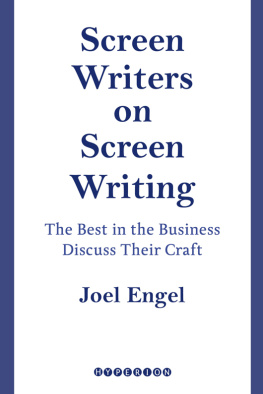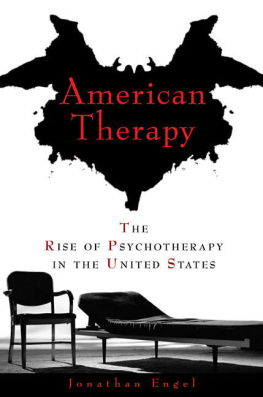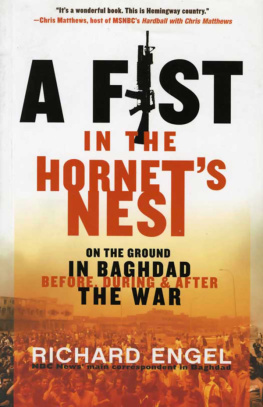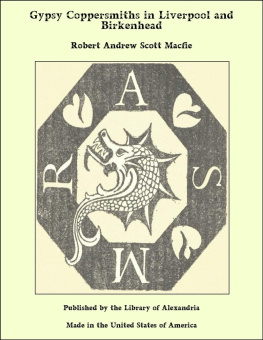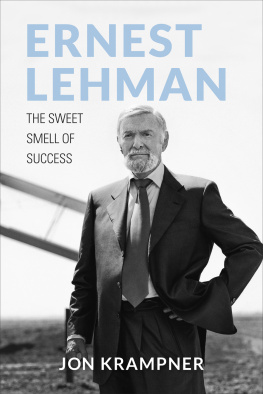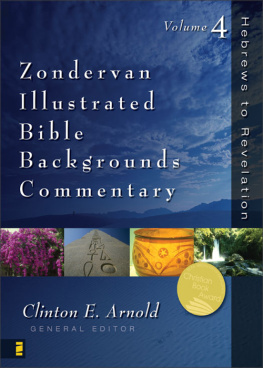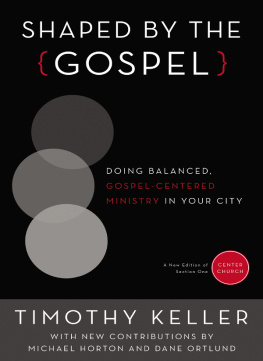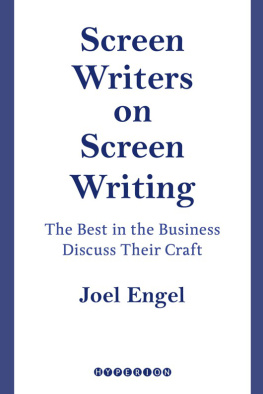SCREEN
WRITERS
ON
SCREEN
WRITING
THE BEST IN THE BUSINESS
DISCUSS THEIR CRAFT
JOEL ENGEL
HYPERION
NEW YORK
The best screenwriters in the business examine film-making processes and the writers contributions to film efforts, using a question-and-answer format to explore such issues as writer control over screenplays, characterization, and plot. An excellent guide to screen-writing achievement, politics and realities.
Midwest Book Review
To my cousin Irene,
who taught me the worth of a good story.
Contents
Borden Chase was a Hollywood screenwriter. When he turned his western novella Guns Along the Chisolm Trail into Red River sometime in the late forties, the term screenwriter was somewhere between a condescending pejorative and calling a writer a pandering slut. In those far-off times the added qualifier Hollywood was not much more than gilding the hooking ladys lily.
Fifty years later I think its fair to say the epithet is no longer so disreputable. Since Cahiers du Cinema and The Village Voice first helped turn movies into film I dont think its unfair to say that theres a certain cachet associated with the term. Screenwriters are now the architects (or draughtsmen depending on what end of the artist-artisan scale the film critic decides to place us) of what is increasingly referred to as the dominant art form of the twentieth century. Indeed a serious young writer-director can easily find himself and his first film referred to and discussed with increasingly risible gravity, a creative force whose very voice and self threaten to change the world of art and life as we know it, and all on a budget of less than twenty million.
Only when the contemporary film critic or ET host adds the Hollywood to screenwriter do we get any echo of the automatically low regard in which the screenwriter was once routinely held and routinely held himself. Such third-rate parttime scribblers for the screen as Fitzgerald, Faulkner, Dorothy Parker, Nathanael West, Clifford Odets, or those shabby more-or-less full-timers like Ben Hecht, Charles Brackett, Billy Wilder, Casey Robinson, Sidney Buchman, Morrie Riskind, Anita Loos, James Agee, Herman Mankiewiecz, Preston Sturges, dined out on anecdotes designed to point out how much they were paid and how little they were regarded.
I cant recall the studio or the studio head, it may have been Columbia and Harry Cohn (it sure sounds like Harry) but theres this paradigmatic story of the mogul in question and his writers under contract. Passing by the writers bungalows at lunchtime, as was his custom, he cocked his ear and waited to hear typewriter keys slamming into foolscap, a sound he expected to be as continuous as the waves breaking on State Beach. There was dead silence. Indignation rising, the mogul peered into a bungalow window: the typewriters were unattended and his two writers were stretched out on a couch and studio divan, dead to the world. Before he could fire the lazy louts, one of them managed to catch the outline of their boss lurking ominously in the bungalow window. Waiting only a split-second, the writer smacked his hand to his forehead and leapt to his feet, yelling excitedly, Ive got it! Ive got it! Ive solved the third act!
History, apocryphal or otherwise, does not record the moguls reaction to this burst of inspired self-preservation but presumably he moved on satisfied that his scribes, vertical or horizontal, were ever and always on the case. Any lunch hour of these writers buildingcommissary war stories had more entertainment value than can be found in most of our screenplays today. Movies were movies, men were men, screenwriters scribes, and their work sparkled with wit, joy, and subversive significance. The point beingif anyone were in doubtthat taking screenwriters more seriously today does not seem, on the whole, to have made us better screenwriters. Or made for better movies.
Over a number of years, I went to the bandy-legged Borden Chases house for a ritual Christmas dinner. Borden looked like a tougher, more glamorous version of James Gleason, Robert Montgomerys prizefight manager in Here Comes Mr. Jordan. Borden had been a sandhog and worked on the Holland Tunnel. Hed been a roughneck and a roustabout, a tough little bantam rooster with an eye for the ladies and a wonderful way with scenes involving confrontations between men (Clift and Wayne in Red River; Burt Lancaster and Gary Cooper in Vera Cruz; Jimmy Stewart and Dan Duryea in Winchester 73).
Theres an especially memorable Mexican standoff between John Ireland as Cherry Valance and Montgomery Clift as Matthew Garth, two young bucks who it appears will inevitably shoot it out, in Red River. The scene is not one of tough-guy, in-your-face posturing. On the contrary, it is playful and polite. They engage in target practice on the open plains, taking a break from the business of driving John Waynes cattle herd to market. Ireland shoots and knocks the shit out of some bottles and rocks. Clift admires the display. Then Clift shoots the shit out of some bottles and rocks on the ground and in the air. Ireland is hugely admiring of the display. Now I know who youd be, he says with a wide grin, fairly licking his lips at the prospect of facing a gunfighter of Clifts skills and reputation, youd be Matthew Garth! Youre as good as they say you are. Clift returns compliment for compliment. They exchange weapons to see what the other fellows got for equipment in a shamelessly Freudian Ill-show-you-my-gun-if-youll-show-me-your-gun display. They admire the hell out of each others long barrels, stroking them, purring over them, before they return them, Ireland wistfully adding, Theres nothing like a good gun or a Swiss watchor a woman from anywhere. Ever had a good Swiss watch?
There was one particular part of the Chases Christmas dinner that sometimes involved a bit of writing. Everyone at the table was obliged to come up with a toast. They were sometimes inventive, amusing, elaborate, but there was always one that brought the table to a respectful silenceTo absent friends.
Im old enough to have glimpsed those writers and their times but too young to have lived and worked with them. I have no regrets about having missed that semifabled epoch when men were men, women women, and writers rogues, but I increasingly feelI suspect we all dothat the history of life on earth is not one of evolution so much as devolution. With each succeeding generation we get weaker and smaller; the Titans are always in the past. Theyre the original, were the Xeroxed copies, each generation growing progressively more blurred and degenerate.
This is a romantic fancy of course, but having succumbed to it I should add that the writers interviewed here have talents that would serve them well in any age.
Still, I cant help but look back from the vantage of relative respectability and say, To absent friends.
Robert Towne
January 19, 1995
When approached to star in a proposed movie, Julia Roberts and Mel Gibson (and Michelle Pfeiffer and Jack Nicholson and Denzel Washington, et al.) naturally inquire about the director, the costars, and the producer. Only after reading the script, however, do they make their decisions.
How important is the script to moviemaking? Good scripts can be made into bad movies, but good movies cant be made from bad scripts. Bad movies may not share anything in common; good movies certainly do. While the script may not be everything, everything else is worthless without it.
If that seems overstated, think again. Hollywoods tendency is to package movies. Executives and producers bundle all the elements that they believe audiences wantstars, exotic locales, pyrotechnics, etc.and often pay little mind to the script. Its no surprise that so many films end up like the emperor parading without his clothes.

